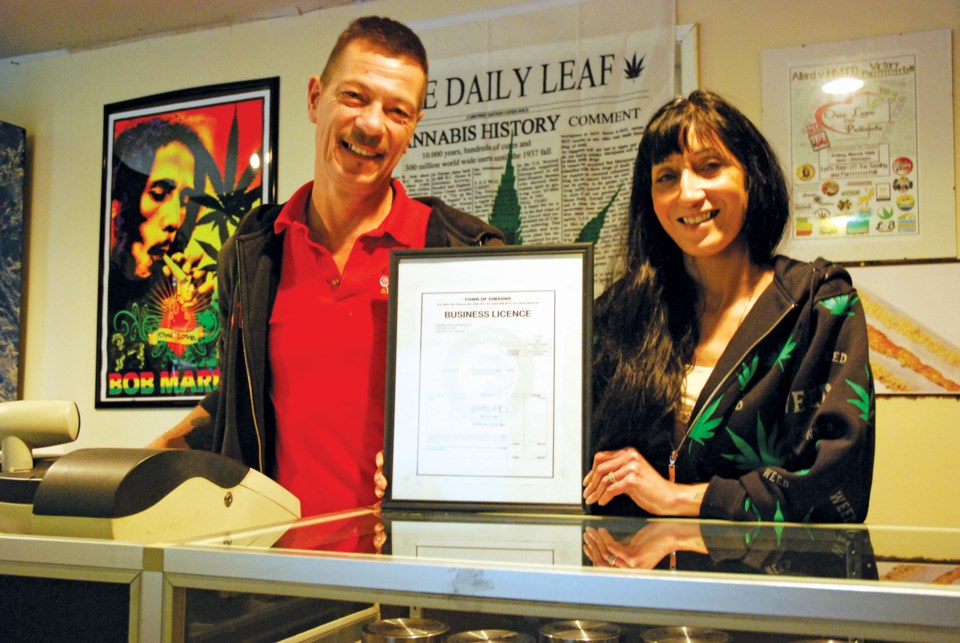The mayors of Gibsons and Sechelt say, despite a lot of questions that still need to be answered, they’re pleased with the control municipalities will have under the province’s system for marijuana sales.
Minister of Public Safety and Solicitor General Mike Farnworth announced the framework for the sale of non-medical cannabis on Monday.
It will be a combination of publicly owned retailers and private sellers, with the provincial government having exclusive control of wholesale distribution through the Liquor Distribution Branch, which will also run the public retailers and online sales.
Farnworth said the public stores will be separate from the government liquor store chain and licensed retailers will be restricted from selling cannabis in the same stores as liquor or tobacco.
The provincial rules will also require anyone who wants to sell cannabis, including the province itself, to have the full support of the local government where they plan to set up shop. Farnworth said local governments would have the option to ban cannabis sales within their jurisdictions.
“They’ve given the local governments and municipalities a lot more say on this particular retail enterprise compared to anything else. Far more control than we have on liquor outlets, for example,” said Sechelt Mayor Bruce Milne.
“They’re going to require a resolution from council before they issue any provincial retail licences and they’ve mandated that we have to have public consultation… That really puts the decision into the community and into the neighbourhood.”
Milne, who is also the chair of the Sunshine Coast Regional District, said he was pleased to hear that regional districts will have a similar say. “In the broad sense the regional district board will have some zoning control, so they’ll be able to identify the areas they go into, and there will need to be a local government authorization – a resolution from the board.”
Gibsons Mayor Wayne Rowe said, “I’m pleased to see that they’re giving a reasonable amount of authority to the local governments to determine what’s suitable for their communities… This way, at least, we can look at it from the perspective of what our residents think about these outlets.”
The government’s plan includes exceptions for rural areas that Farnworth said will be similar to the rules that allow so-called “agency” stores to sell liquor, as is the case in places like Roberts Creek or Halfmoon Bay. However, the criteria for determining what counts as a rural area where cannabis sales are concerned haven’t been finalized.
“I don’t know if that means towns like Gibsons and Sechelt or whether we’re talking about very, very small communities. It’ll be interesting to see what they’ve got in mind there,” Rowe said.
Milne said another question is whether the regulation against selling cannabis in the same locations as tobacco or alcohol will be waived for rural areas.
Sechelt has three dispensaries operating in the downtown core, but the district has never issued business licences for cannabis retail.
“In terms of the general placement in the commercial areas, and which parts of those commercial areas, I think council has been monitoring the situation and doesn’t see any immediate problems with current locations,” Milne said.
Gibsons has two operating dispensaries and a compassion club with a storefront. All have business licences, but Rowe said he expects council will be having in-depth discussions around issues like location as the provincial and federal rules become clearer.
People who’ve already opened dispensaries, which remain illegal for now, will not be barred from applying for the provincial licences.
Michelle and Doug Sikora’s S&M Medicinal Sweet Shoppe is one of the dispensaries in Gibsons, and Michelle Sikora told Coast Reporter that she thinks the provincial government is on the right track.
“From our perspective, it is a move in the right direction with lots of work still to be done,” she said. “Not everyone will be happy with the announcement, but I believe B.C. residents are definitely in a better position than the rest of the country.”
Keir MacPherson, operator of the WeeMedical Dispensary Society location in Sechelt, said he also thinks the province is moving “by and large” in the right direction by showing a willingness to “leave business to the small business owners.”
MacPherson also said there could be some advantages to the Liquor Distribution Branch taking on the wholesale side. “They have mechanisms of quality control in place that I really agree with… I just hope that they’re willing to be flexible with working together with some of the current LPs [Licensed Producers].”
Farnworth is leaving the door open to small producers, especially after hearing from the Craft Cannabis Association of BC during last year’s public consultation. The association estimates the province’s “independent cannabis industry” is worth $5 billion and “is the backbone of local economies across many communities in B.C.,” many of them in rural areas.
Farnworth said that the federal government, however, has the final say on where the Liquor Distribution Branch will be able to get its supply. “It’s an important issue in British Columbia and it’s something that I have raised with the federal minister,” he said. “Production is in the hands solely of the federal government… It’s something we’re working on and trying to advance with the federal government.”



